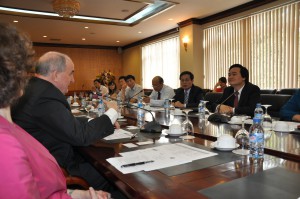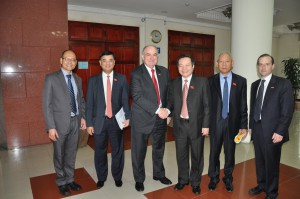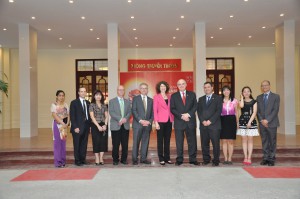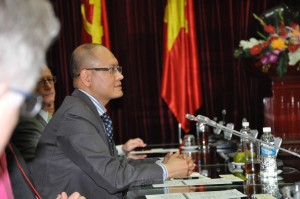A productive and historic day in Hanoi
Here in Hanoi, about the first thing you notice is the honking. Incessant honking from the mass of motorbikes that swerve around cars, buses, bicycles and pedestrians like in some kind of video game. Not angry downtown Manhattan-style honking, mind you. The Vietnamese don’t drive as much by sight as they do by sound, we were told upon our arrival, which you have to hear to believe. (Apparently, one of the biggest sources of work in Hanoi is, not surprisingly, horn replacement.)

IU President McRobbie, left, addresses Vietnam National University President Phung Xuan Nha, right, and VNU faculty.
Then there’s the humidity. It’s already summer here, and the driving rain that greeted members of the IU delegation upon their arrival Monday evening did little to cool off the hot and sticky temperatures.
But as members of the IU delegation quickly found out, it’s best not to let yourself be distracted by the noise and the heat. Otherwise you’d miss the beauty of a 1,000-year-old capital city that boasts an impressive and eclectic cityscape, one dotted by skyscrapers and scenic lakes, temples, towers and tree-lined boulevards, closet-sized markets and massive monuments, modern-looking hotels and colonial structures that are a mixture of French and traditional Vietnamese architectural styles.
All of these aesthetic features (Hanoi hosts more cultural sites than any other city in Vietnam), along with an impressive infrastructure, reflect a dynamic city that has experienced rapid economic growth in recent years. They also demonstrate the enormous tension that exists in Vietnam, a single-party state that is ruled by the Communist Party, is seeking to overcome its centuries-old challenges and more modern-day events, such as the Vietnam War, and is continuing to move toward a more market-based, entrepreneurial economy.
It is here in this complicated and changing city that Indiana University hopes to expand on its longstanding tradition, dating back more than a half-century, of international outreach and institution-building in nations that have successfully tapped the university’s vast educational and research capabilities. In Asia alone, IU’s efforts have contributed to the strengthening of educational and governmental institutions in, among other nations, Thailand, Indonesia, Malaysia and, most recently, Myanmar.
IU has a similarly vibrant institution-building effort well underway in Vietnam. Faculty experts from the university’s School of Public and Environmental Affairs, the No. 2-ranked school of its kind in the United States, are engaged in building relationships in Vietnam, specifically in the areas of finance and public administration, where Vietnam has substantial shortcomings.
Leading the overall effort by SPEA in Vietnam to expand IU’s presence and, in particular, its contributions to the betterment of the Vietnamese national government are David Reingold and Anh Tran. Reingold, executive associate dean of SPEA, has helped forge partnerships between IU and Vietnam’s Ministry of Education and Training and with Vietnam National University. Tran is a native of Vietnam, a professor at SPEA and founder of the Vietnam Young Leader Awards, a prestigious scholarship program that brings outstanding government officials from Vietnam to the U.S. for master’s and Ph.D. degrees. (As an aside, Tran also doubled as the IU delegation’s tour guide and translator today in Hanoi, where he grew up.)
Reingold and Tran joined the rest of IU’s Asia delegation — including IU President Michael A. McRobbie, the first standing IU president to visit Vietnam and one of few major U.S. university presidents to visit this country — at back-to-back-to-back meetings today that were, by everyone’s account, enlightening, productive and extremely promising. The first of those meetings took place at Vietnam National University, the first modern university ever established in the country and one of the two national universities in Vietnam. IU established a university-wide partnership agreement with VNU in 2009, and the two schools are seeking to ramp up collaborations among their faculty and staff in environmental studies and other areas of mutual interest.

IU President McRobbie shakes hands with Dr. Phung Quoc Hien, chairman of the Committee for Financial and Budgetary Affairs at the National Assembly of Vietnam. IU SPEA representatives Anh Tran and David Reingold are far left and right, respectively.
Additionally, IU will be looking to soon establish a center for Southeast Asian studies in its new School of Global and International Studies. The university also hopes to add several dialects of this region, including Vietnamese, to its already record number of languages taught (70 to 80 in any given year). As IU Vice President for International Affairs David Zaret indicated, VNU seems “well-positioned” to help IU grow its programs and expertise in this area of the world.
From VNU, it was on to the National Assembly, the impressive structure that houses Vietnam’s 498-member legislative body. There, members of the delegation met with members of the Vietnamese parliament’s Committee for Financial and Budgetary Affairs, including its chairman, Dr. Phung Quoc Hien. Dr. Hien was candid about the challenges facing his committee and his country. He expressed a strong interest in IU experts providing specialized teaching and consultancy in several law and policy areas in which he said many high-ranking Vietnamese government officials have limited knowledge and expertise, including excise tax, expenditure, housing, real-estate and revenue.
When it was his turn to speak, IU President McRobbie talked about IU’s considerable and internationally recognized expertise in public policy and financial management, which he and Dr. Hien agreed could serve as the basis of strong collaborative activities between their respective institutions.
The National Academy of Public Administration served as the delegation’s last stop in a busy day in Hanoi. “I feel like I’m home here,” Anh Tran commented, offering a slight hint at how closely Tran and his colleagues at SPEA, including David Reingold, have worked to solidify a strong relationship over the past several years with the National Academy of Public Administration, which provides undergraduate, graduate and postgraduate education in law, administration and government management for students and public servants in Vietnam.

Members of the IU delegation pose for a picture with several of their hosts from Vietnam’s National Academy of Public Administration.
Since the signing of an official partnership agreement in 2012, SPEA and the National Academy of Public Administration have initiated a number of faculty and student scholarly exchanges as well as research projects, and today’s visit set the stage for even greater collaboration as NAPA, led by President Nguyen Dang Thanh, seeks to develop a successful system of “basic training” on law and public policy matters for high-ranking government officials.
On Wednesday morning, members of the IU delegation hope to see a little more of Hanoi, experience this unique city more fully and reflect on a historic and productive day that served to suggest that the pieces are in place for IU to continue its longstanding tradition of successful institution-building here in Asia.
Tags: Anh Tran, David Reingold, Hanoi, Indiana University, IU, Michael A. McRobbie, NAPA, National Academy of Public Administration, Phung Quoc Hien, School of Global and International Studies, School of Public and Environmental Affairs, SPEA, Vietnam, Vietnam National Assembly, Vietnam National University, Vietnam parliament, Vietnam Young Leader Awards, Vietnamese, VNU
 Indiana University
Indiana University


